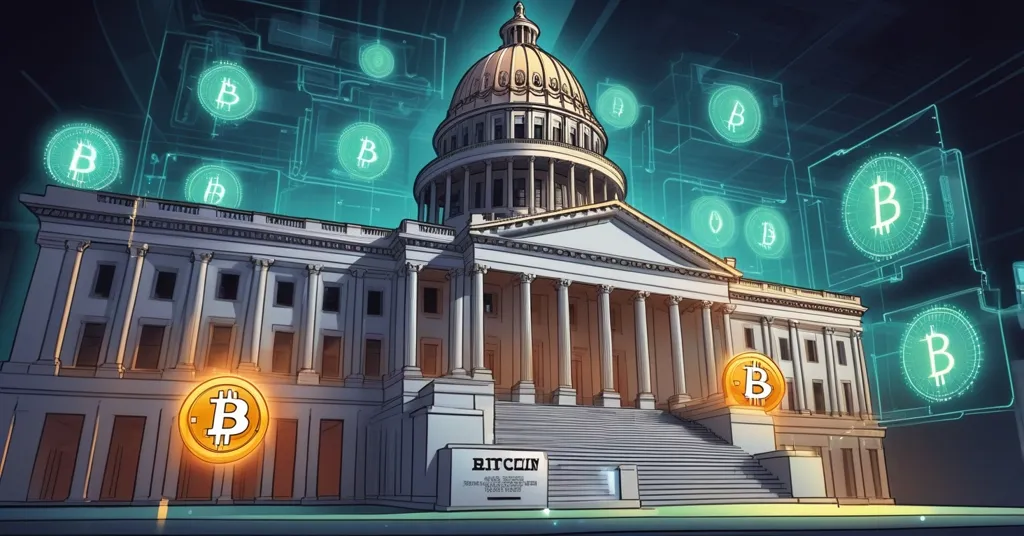Arizona Establishes Bitcoin Reserve with HB 2749, Following New Hampshire’s Lead

Arizona Joins the Bitcoin Reserve Club: House Bill 2749 Unveiled
Arizona has boldly stepped into the digital asset arena, becoming the second US state after New Hampshire to establish a Bitcoin reserve. Governor Katie Hobbs signed House Bill 2749 into law, setting the stage for unclaimed digital assets to be managed in a “Bitcoin & Digital Assets Reserve” without touching taxpayer funds.
- AZ’s HB 2749 establishes a Bitcoin & Digital Assets Reserve.
- Unclaimed digital assets transferred to the state in their native form.
- State can stake proof-of-stake assets and collect on-chain distributions.
- Reserve managed by the State Treasurer, budget-neutral.
- Bipartisan support led by Rep. Jeff Weninger.
The Details of HB 2749
House Bill 2749 mandates that unclaimed digital assets be transferred to the Arizona Department of Revenue in their original form after three years of outreach to the owner. This means the state can hold onto these assets, potentially staking proof-of-stake assets (where participants earn rewards for holding and supporting the network) and collecting on-chain distributions (payments directly on the blockchain). The reserve fund, overseen by the State Treasurer, is designed to be budget-neutral, meaning it does not use taxpayer money.
Comparing Arizona and New Hampshire
While Arizona’s approach involves managing unclaimed digital assets, New Hampshire’s HB 302 allows for up to 5% of state funds to be invested in Bitcoin. New Hampshire emphasizes security and transparency, requiring U.S.-regulated custody for the assets. Both states are setting a precedent, but their strategies differ, with Arizona focusing on existing unclaimed assets rather than direct investment.
The Legislative Journey
House Bill 2749 received strong bipartisan support, passing the House with a vote of 57-0 and the Senate with a vote of 20-8. Rep. Jeff Weninger, the bill’s sponsor and Republican chair of the House Commerce Committee, emphasized the importance of digital assets in today’s financial landscape.
“Digital assets aren’t the future—they’re the present,” he stated, highlighting the need to manage these assets wisely.
Weninger also pointed out the potential benefits for the state, saying,
“This law ensures Arizona doesn’t leave value sitting on the table and puts us in a position to lead the country in how we secure, manage, and ultimately benefit from abandoned digital currency.”
Dennis Porter, CEO of the Satoshi Action Fund, which provided technical assistance for the legislation, praised the move.
“Arizona just showed the country how to turn forgotten assets into a fortress against inflation,” he remarked, highlighting the potential of Bitcoin as a hedge against economic volatility.
Porter further added,
“With HB 2749, lawmakers converted dormant dollars into digital gold—without touching the taxpayer’s pocket. It’s a win for fiscal responsibility and for every Arizonan who believes in sound money.”
Despite the success of HB 2749, Governor Hobbs vetoed Senate Bill 1025, a broader proposal that would have allowed direct investment of public funds into Bitcoin, citing concerns about investing in “untested assets.” Meanwhile, Senate Bill 1373, which would authorize up to 10% of the state’s Budget Stabilization Fund to be invested in Bitcoin, awaits Hobbs’ decision.
Economic Implications and Benefits
The management of unclaimed digital assets through HB 2749 could provide Arizona with a new revenue stream without affecting taxpayer funds. By staking these assets and collecting on-chain distributions, the state can potentially generate income and protect against inflation. This approach could serve as a model for other states looking to diversify their reserves and future-proof their treasuries.
Potential Risks and Criticisms
While HB 2749 presents opportunities, it’s not without its critics. Some argue that managing digital assets is a gamble, especially given the volatility of cryptocurrencies. The state’s cautious approach, focusing on unclaimed assets rather than direct investment, addresses some of these concerns, but the crypto space remains risky. Yet, Arizona’s move is a testament to the belief in the potential of digital assets to enhance state financial strategies, even if it means navigating some uncharted waters.
The Future of Digital Assets in Public Finance
Arizona’s pioneering step could catalyze a new era of financial strategy, embracing decentralization and innovation. As more states observe the benefits of integrating digital assets into their financial frameworks, we might see a national trend emerge. The success of these legislative efforts could encourage a broader acceptance of cryptocurrencies, potentially reshaping public finance in the years to come.
Key Takeaways and Questions
- What is the purpose of House Bill 2749 in Arizona?
The purpose is to establish a “Bitcoin & Digital Assets Reserve” using unclaimed digital assets, thereby managing and deriving benefits from these assets without affecting taxpayer funds.
- How does Arizona’s approach differ from New Hampshire’s in terms of Bitcoin reserves?
Arizona requires unclaimed digital assets to be transferred in their native form, whereas New Hampshire allows investment of up to 5% of state funds into Bitcoin.
- What are the potential benefits of Arizona’s Bitcoin reserve law?
It allows the state to secure, manage, and benefit from abandoned digital assets, potentially offering a hedge against inflation without using taxpayer money.
- Why did Governor Hobbs veto Senate Bill 1025?
Governor Hobbs vetoed it due to concerns about channeling public money into “untested assets.”
- What is the current status of Senate Bill 1373 in Arizona?
It is awaiting Governor Hobbs’ decision and would authorize the state to allocate up to 10% of its Budget Stabilization Fund to Bitcoin.
- What role did the Satoshi Action Fund play in Arizona’s legislation?
The Satoshi Action Fund provided technical assistance during the drafting of the legislation and praised its enactment as a model for other jurisdictions.
As Arizona leads the charge in integrating digital assets into public finance, the future looks promising for cryptocurrencies. While challenges remain, the potential for Bitcoin to enhance state treasuries and protect against inflation is becoming increasingly evident. This move by Arizona could be the spark needed to ignite a new era of financial innovation and decentralization.



